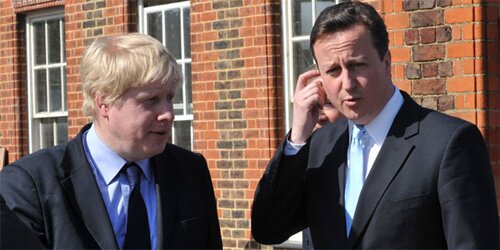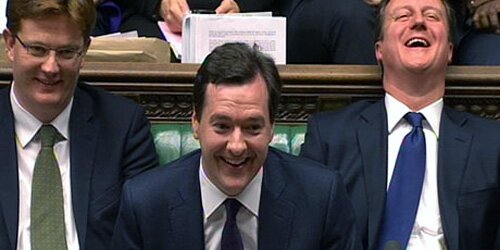Is George Osborne serious about tackling tax-evasion too?
9:20 am - February 18th 2013
| Tweet | Share on Tumblr |
George Osborne wrote an article for the Observer yesterday committing to multilateral action against tax evasion and claiming to be leading G20 finance ministers in a new initiative.
Along with reiterating his pledge to meet the UN target for overseas aid in the coming tax year, he opposed multinational corporations dodging their UK taxes by shifting profits overseas, and also opposed the way they do the same – with even worse impacts – against developing countries.
It may seem churlish not to welcome the repentance of such a serial sinner (he’s still cutting the UK’s corporate tax rate, and has refused to u-turn on the decision to cut the top rate of income tax, remember.) But is this really the same politician who has refused to join – and tried unsuccessfully to scupper – the European Robin Hood Tax on financial transactions? It surely is.
There’s a possibility that Osborne really is fed up with the way Amazon, Google, Starbucks and the rest have tried to avoid paying UK tax. And it’s also possible that Osborne is trying to claim credit in the UK for a move portrayed in other countries as an EU initiative led by the finance ministers of France and Germany, as well as the UK: the leg-work for this initiative was done by the Paris-based Organisation for Economic Co-operation and Development (OECD).
It would be easy for Osborne to dodge the argument that he might start out by addressing the problem caused by the tax havens the UK oversees: he will simply claim that the only way to defeat tax arbitrage is by a global agreement rather than unilateral action.
Although if he’s such a committed multilateralist all of a sudden, that refusal to endorse multinational action on transaction taxes (to defend the City of London, he says) looks harder to explain.
And his lacklustre crack-down on giving public contracts to tax avoiders (he’s so committed to this that he’s letting them carry on securing contracts in the health service, education, local government; and all they have to do is swear they never, ever did anything naughty to escape the crack-down…) does not inspire confidence either.
Nor does the omission of tax dodging from DFID Secretary of State Justine Greening’s recent panegyric to the private sector….
So, all in all, underwhelmed is how Osborne’s startling conversion to global tax justice leaves me. But let’s look on the bright side, and wait to be impressed. We will watch the space where action against tax havens and tax avoiders should appear.
| Tweet | Share on Tumblr |  |
Owen Tudor is an occasional contributor to LC. He is head of the TUC’s European Union and International Relations Department and blogs more regularly at the Touchstone blog.
· Other posts by Owen Tudor
Story Filed Under: Blog ,Economy ,Europe ,Foreign affairs
Sorry, the comment form is closed at this time.
Reader comments
Although if he’s such a committed multilateralist all of a sudden, that refusal to endorse multinational action on transaction taxes (to defend the City of London, he says) looks harder to explain.
No it doesn’t. The City of London doesn’t compete with Paris, Frankfurt or Milan as a financial centre, it competes with New York, Singapore, Hong Kong, Seoul and Tokyo.
http://en.wikipedia.org/wiki/Global_Financial_Centres_Index
Have a quick look at that list of financial centres: London is ranked first in the world. The next highest EU Member State is Frankfurt at 10. Paris comes in at 23. They aren’t our direct competitors.
“Although if he’s such a committed multilateralist all of a sudden, that refusal to endorse multinational action on transaction taxes (to defend the City of London, he says) looks harder to explain.”
And it’s also possible that an FTT doesn’t actually achieve any of its claimed aims.
You know, doesn’t raise any revenue, doesn’t reduce price volatility?
That, as I’ve been saying for some years now, it’s simply a bad tax?
But here’s something for you Owen. It looks like there’s going to be that eurozone (well, srota) FTT in 2014. And there won’t be one in the UK and a number of other countries. Excellent, this is a nice natural experiment. We can now study what are the actual effects of an FTT.
You, as one of the great proponents of it will indeed be studying the effects, won’t you? You will come back and tell us all how its working?
Specifically, you’ll be looking at how the imposition of the tax changes price volatility in the places where it applies as against those where it does not? You have already put aside a budget to do this I hope?
Take a look at this:
“Help LibDem Voice by buying from Amazon”
(from their website)
Embracing multilateralism in the EU negotiations to break open the Swiss accounts of tax dodgers, all and any accounts on request, would have been the behaviour of a government being tough on tax. Naturally the UK went and did a worse deal allowing us to make 20 request a year, hardly a number large enough if you are tackling hundreds or thousands of dodging and avoiding cases each year. It’s only been a few years, but Osborne has built up form as a soft touch on large scale tax avoidance.
Reactions: Twitter, blogs
Sorry, the comment form is closed at this time.
NEWS ARTICLES ARCHIVE






















